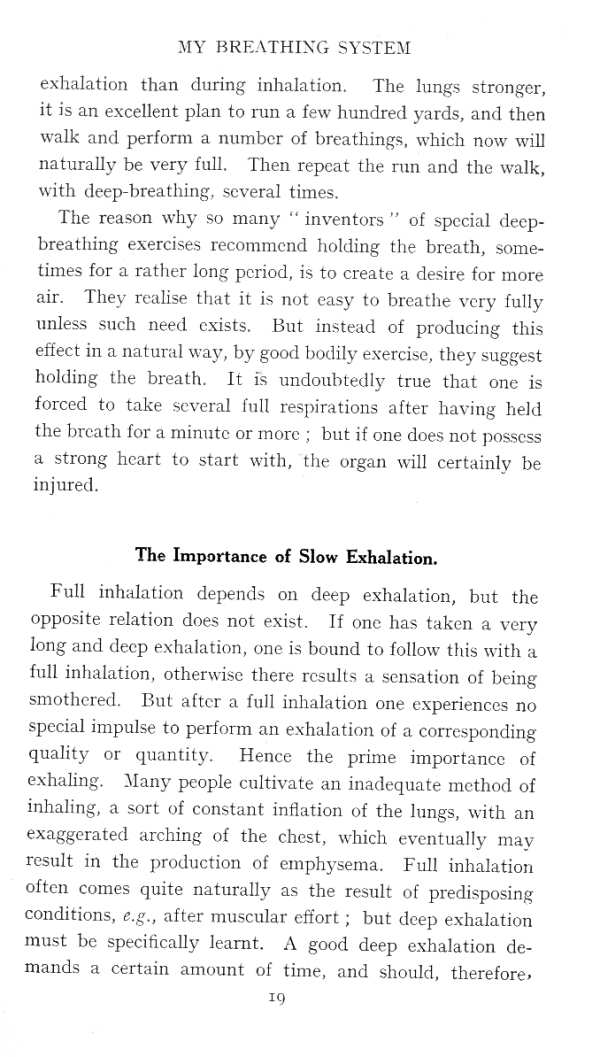mbs 019

MY BREATHDfG SYSTEM
exlialation than during inhalation. The lungs strongcr, it is an excellent plan to run a few hundred yards, and then walk and perfonn a number of breathings, which now will naturally be very fuli. Then repcat the run and the walk, witli deep-breathing, scveral times.
The reason why so many " inventors ” of spccial deep-breathing exercises recommcnd holding the breatli, some-tiines for a rather long period, is to create a desire for morę air. They realise that it is not easy to breathe vcry fully unless such need cxists. But instead of producing this effect in a natural way, by good bodily exercise, they suggest holding the breath. It is undoubtedly true that one is forced to take several fuli respirations after having held the breath for a minutę or inorc ; but if one does not possess a strong hcart to start with, the organ will certainly be injured.
The Importance of Slow Exhalation.
Fuli inhalation depends on deep exhalation, but the opposite relation does not exist. If one has taken a very long and deep exhalation, one is bound to follow this with a fuli inhalation, otherwise tliere rcsults a sensation of being smothered. But after a fuli inhalation one cxperiences no special impulse to perfonn an exhalation of a corresponding ąuality or ąuantity. Hence the prime importance of exhaling. Many people cultivate an inadeąuate method of inhaling, a sort of constant inflation of the lungs, with an exaggerated arching of the chest, which eventually rnay result in the production of einphysema. Fuli inhalation often comes quite naturally as the result of predisposing conditions, c.g., after muscular effort; but deep exhalation must be specifically leamt. A good deep exhalation de-mands a certain amount of time, and should, therefore>
19
Wyszukiwarka
Podobne podstrony:
mbs 124 MY BREATHING SYSTEM be found invaluable froin the point of view of increasing the rangę of e
46096 mbs 075 MY BREATHING SYSTEM now becn convinced of the fact that this “ mania for exercise ” is
mbs 106 MY BREATHING SYSTEM almost unknown and where tlie influence of fashion is so powerful. Of co
mbs 014 MY BREATHING SYSTEM slow, regular respiration, even during the hardcst and most protracted e
mbs 053 MY BREATHING SYSTEM navel, or at all events not higher than on a level with the openings of
mbs 090 MY BREATHING SYSTEM EXERCISE No. 3. Fuli breatbing during twisting of trunk to alternate sid
mbs 098 MY BREATHINT. SYSTEM EXERCISE No. 7. Fuli breathing during twisting and leaning to alternate
więcej podobnych podstron